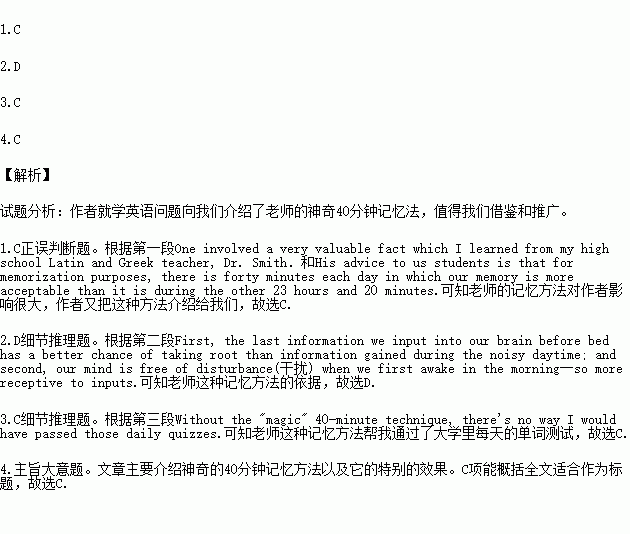题目内容
Recently I had a conversation in Beijing with an adult Chinese friend who was complaining how difficult it was to study English. No surprises there. It is a difficult language to master, just like Chinese. I made a few suggestions based on my experience. One involved a very valuable fact which I learned from my high school Latin and Greek teacher, Dr. Smith.He is a gifted linguist (语言学家),and has an amazing ability to remember things, like poetry, essays, speeches, etc.His advice to us students is that for memorization purposes, there is forty minutes each day in which our memory is more acceptable than it is during the other 23 hours and 20 minutes.
This 40-minute "super memory" period is divided into two parts: the 20 minutes before we sleep, and the 20 minutes after we first awake. The theory supporting this is pretty simple. First, the last information we input into our brain before bed has a better chance of taking root than information gained during the noisy daytime; and second, our mind is free of disturbance(干扰) when we first awake in the morning一so more receptive to inputs, like a blank slate(石板).
I took the advice to heart and it served me well in my school years. In my university days, our Chinese teacher would assign us 200 new vocabulary words each day, on which we would be quizzed(测试)the following day. Without the "magic" 40-minute technique, there's no way I would have passed those daily quizzes.
As far as language study goes, it's not only useful for memorizing vocabulary. It's also a very useful window of time to listen to the language we're studying even with background noise, and even if it's at a level we find difficult to understand. It might be audio(声音的)language study, aids, or just radio, TV or whatever.
Beyond our years of formal(正式的) education, memory skills are hugely important in any career. How many times have we heard a speaker read their speech from a prepared text, or read the word-by-word content of a PowerPoint presentation as they present each slide(投影片)? These are annoying, boring, and less effective ways of communicating. They are almost guaranteed(保证) to lose the audience's close attention and interest, let alone persuade or inspire anyone to do anything. And yet lots of people still make this mistake.
If we use the 40-minute technique, we may not succeed in memorizing our presentation content on a 100% word-by-word basis, but we'll be familiar enough so that we can spend much more time making eye contact with our audience. We will get them in the process, while looking at our text instead of staring at it. This will also free up our hands and arms to convey some extra messages through gesture.
As you see, the technique really works, but like many things, it takes practice to perfect it. Therefore, we'd better find ways to use the language outside of the classroom, as regularly and frequently as possible. One basic rule of language learning is, "Use it, or lose it·”
Seize the forty-minute learning window and we'll bring in a rich harvest of language learning.
1.Which of the following is TRUE according to Paragraph 1?
A. Dr. Smith is born with the great ability to memorize things.
B. It is surprising that English is as difficult to master as Chinese.
C. The author's high school Latin and Greek teacher has a positive influence on him.
D. The author made a few suggestions on learning English based on his teacher's experience.
2.The author's teacher suggested the 40-minute“super memory” period partly because_______.
A. it is less noisy in the forty minutes than in the daytime
B. we are always more peaceful when we awake in the morning
C. our brain is more active in the forty minutes than the other time
D. the last information gained before bed is more likely to remain
3.We can learn from the passage that the 40-minute technique .
A. ensures that we understand the difficult language
B. helps a speaker in reading his speech from a prepared text
C. helps the author pass those daily quizzes in his university days
D. makes a speaker remember the presentation content completely
4.Which of the following is the best title for this passage?
A. The Best Way to Learn English
B. The Importance of Memory Skills
C. The “Magic” 40-Minute Technique
D. My Advice on Learning English
 开心快乐假期作业暑假作业西安出版社系列答案
开心快乐假期作业暑假作业西安出版社系列答案 名题训练系列答案
名题训练系列答案
